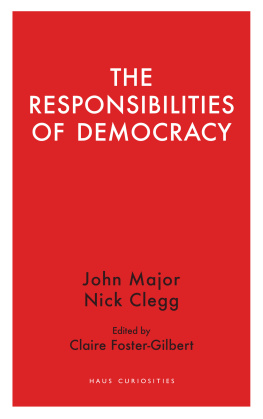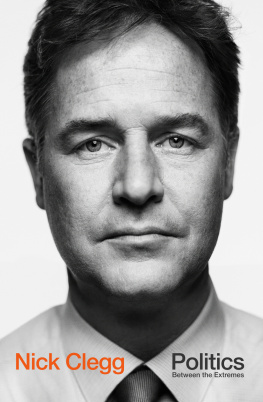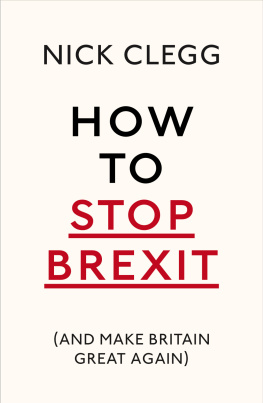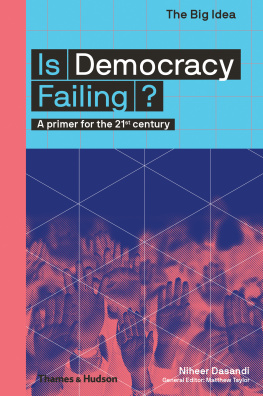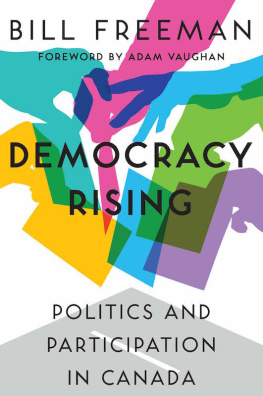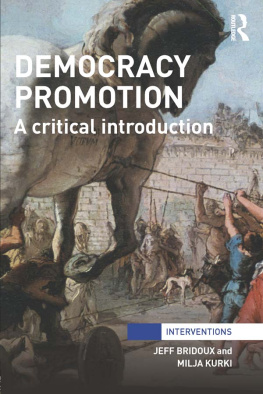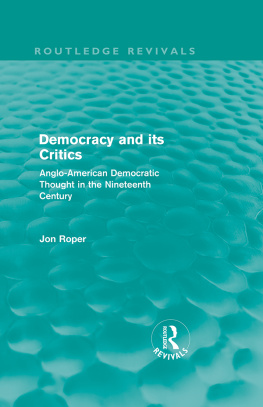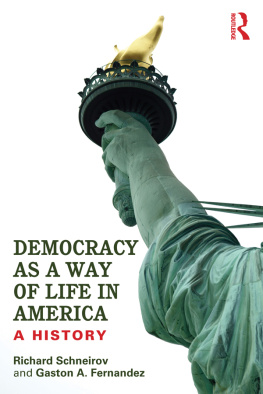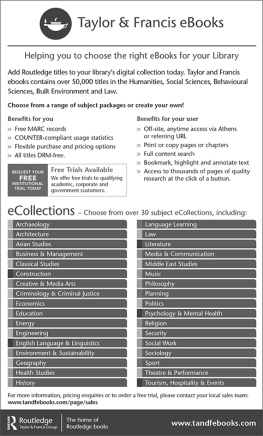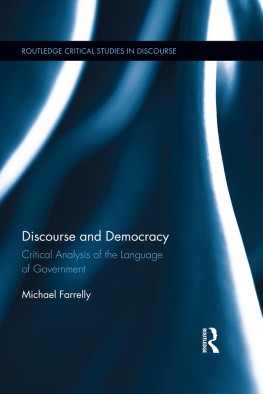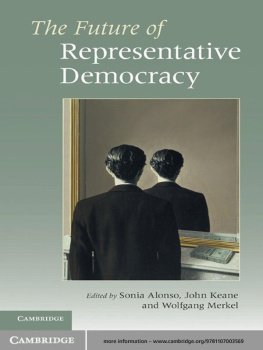First published by Haus Publishing in 2019
4 Cinnamon Row
London SW11 3TW
www.hauspublishing.com
Copyright Westminster Abbey, 2019
The right of the authors to be identified as the authors
of this work has been asserted in accordance with
the Copyright, Designs and Patents Act 1988
A CIP catalogue record for this book is
available from the British Library
Print ISBN: 978-1-912208-73-9
Ebook ISBN: 978-1-912208-74-6
Typeset in Garamond by MacGuru Ltd
Printed in Czech Republic
All rights reserved
Acknowledgements
Sincere thanks are due to the Dean and Chapter of Westminster, the Council of Reference, Fellows and Steering Group of Westminster Abbey Institute, Andrew Blick, Ruth Cairns, Mark Easton, Raa Gillon, Charles Haddon-Cave, Harry Hall, Alice Horne, Kathleen James, Igor Judge, Richard Luce, Sen Moore, Clare Moriarty, Jean-Francois Oliva, Barbara Schwepcke, Gillian Stamp and Simon Surtees.
Introduction
Claire Foster-Gilbert
The role of Westminster Abbey Institute is to nurture and revitalise moral and spiritual values in public life. It does not comment on policy nor campaign for any particular cause. It seeks to offer only those contributions to an active, noisy debate about politics and government that reach to the deep moral and spiritual roots of these institutions in a way that is timely, but also timeless. The essays by Sir John Major and Sir Nicholas Clegg in this book, first given as lectures in West-minster Abbey in 2017, have these qualities. They are only lightly edited because their observations about what threatens and what encourages a healthy democracy were salient at the time they were delivered and remain salient now.
It would be otiose, in a 2019 publication, to ignore the context of the Brexit challenge that is dominating British political and social life. Both Major and Clegg refer extensively to it. The challenge has not diminished in the two years since they spoke on the contrary and so this introduction will analyse further the implications for democracy of the Brexit years. It will do so in the spirit of the Institutes role: not by taking sides, but by highlighting the underlying moral and spiritual stresses the Brexit years have brought upon our public service institutions and the people who work in them, looking in turn at Parliament and government; the Civil Service; and the Judiciary. It will make a plea for a greater understanding and cherishing of our long-established constitutional settlement, as well as for its continuing moral evolution, not its thoughtless destruction.
Parliament and government
The unwritten British constitution puts parliamentary sovereignty at its heart. Parliament is the supreme legal authority in the UK and it can create or end any law. Though they will take its views into account, elected members of the House of Commons can override members of the House of Lords and so, in practice, it is our elected representatives who have the final responsibility to determine the law. This system makes democratic government pre-eminent, which means, rightly, that the people the demos determine who will govern their country.
Seeking election by the people means politicians need to feed and respond to the wishes and wants of the people, make themselves popular and, usually, show charisma. These qualities can sometimes make for unstable and unprincipled leadership. Politicians almost always seek office in order to improve the lives of others, but they want to be recognised for it too. They are willing to play for high stakes and risk sudden tumbles from grace, and they can have fragile egos behind their apparently tough public carapaces. If a politician is virtuous and wise, we are lucky: these qualities are not listed in a politicians job description, and nor does the electorate tend to look for them. An astonishing and telling poll conducted by TheSunday Times during the July 2019 Conservative leadership contest showed that well over 50% of us would not buy Sumption calls elections auctions of promises, and Clegg in his essay concurs. Politicians who stand on doorsteps at election time confessing that they wont be able to achieve much during their time in office because external events tend to dominate and influence most government agendas but that they will do their best under the circumstances, will not gain votes, however honest the confession. Election promises must be strong, substantial and certain, despite the reality that ensues once a party is in power.
These are the fallible people who become our elected representatives in our sovereign Parliament. Their responsibility is pre-eminent, and they are subject only to conventions that have evolved over hundreds of years, to which Chris Bryants magisterial history of Parliament is witness. even though being good is not, as has been said, in the job description.
When policies are not controversial, or there is a clear majority of MPs on the Governments side in Parliament, Parliaments scrutiny of the Executive is noisy but straightforward. Government policies are generally carried. But Brexit is not uncontroversial; indeed it is the most controversial issue in British politics since at least the 1930s, and there is at the time of writing no government majority in the House of Commons and scant agreement among those on the government side of the House. In these turbulent years, MPs have experienced major tensions in the many loyalties they owe: to their constituents (divided over Brexit); to their parties (mostly divided over Brexit); to their leaders (with whom they may disagree over Brexit); to the stability of the country (rocked by Brexit); and to their own consciences (often riven by Brexit). There is no possibility of sleepily voting with or against the Government now.
Within this unsteady hinterland of human fallibility, amendable convention, polarising loyalties and a fiendishly difficult task, MPs are under intense pressure to deliver a goal demanded by a referendum that was inserted into our parliamentary system for our all-too-human MPs. Otherwise, those who have some virtue and wisdom in them, who might think to stand or remain as MPs, will simply not take the personal, moral and spiritual risk.
The Civil Service
The constitution provides balance to its volatile heart of democracy with a Civil Service that is politically impartial.
The Brexit years have coincided with a time of questioning objective truth. There is a great value in this: objective truth is indeed elusive, and those who claim they have it are rarely right. Too much self-confidence can lead to groupthink, and the Civil Service is addressing this tendency with a young but active culture of diversity. But the post-modern recognition that there is no such thing as a view from nowhere has been hijacked in the Brexit years by unscrupulous rivals who claim that no objective truth means no truth. Every statement is contestable on this basis: you only say that because you are a Leaver/Remainer, and I will not trust a word of it. Post-truth thinking makes reasonable debate impossible because not only is there no view from nowhere but there is no common view at all. The tendency is exacerbated, though not caused, by the advent of digital technology and social media as they can reinforce prejudices, as Clegg observes.

